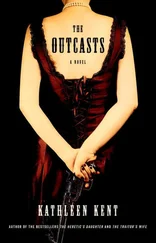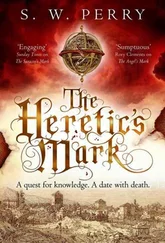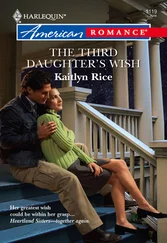The last to give testimony was Allen Toothaker, who said that when he had fought with Richard last March outside our barn not only had Mother’s spirit gone out to render him motionless but mine did as well. He said that he was frequently tormented by spectral visitations in my form and that it had caused him much grief. He was dismissed and as he passed me he raised his thumb to his face and raked it slowly and deliberately down from the bridge of his nose to the nostrils. He had waited a long time to give me back what I had given him after his drubbing with Richard. There was some small comfort in knowing that his cheek was marked with a crescent scar, still angry and red, from the cinders that were meant to burn down our barn. The crescent shape of the letter “C”; “C” for coward, or for calumny.
As we were taken from the court a young woman was being led before the judges, and I recalled seeing her in the Andover meetinghouse. She was the granddaughter of the Reverend Dane and she would be the first of many in that family brought to the Salem trials. Her eyes were fixed and staring as though she walked while she slept, and behind her trailed a yellow stream, her body’s water that could not be held against the growing heat of her fear.
Tom and I were placed in another cart and taken the five miles into Salem Town, east down the main street, the smell of brine and tidal pools coming sharp off the South River. As we passed each street and house of note, the sheriff, George Corwin, would call out, “Here is the house of your judge Jonathan Corwin.” “Here is the house of your judge John Hathorne.” “Here, then, is the meetinghouse,” as though we were only lost and asking the way to be brought home again. Just before we turned north to go up Prison Lane he pointed and said, “Yonder is the house of the Governor-that-was, Simon Bradstreet,” and the memories of reading with my mother the poems of his wife, Anne Bradstreet, came flooding back. But I could not remember the passages of hope won, only those of loss.
My pleasant things in ashes lie,
And them behold no more shall I.
Under thy roof no guest shall sit,
Nor at thy table eat a bit.
No pleasant tale shall e’er be told,
Nor things recounted done of old.
No candle e’er shall shine in thee,
Nor bridegroom’s voice e’er heard shall be.
In silence ever shall thou lie…
When we are babes newly born and the midwife pulls us through the passage from our mother’s womb into the world, it is the sense of smell that awakens us first to our new realm of living. Babes are near blind and without strength to govern their limbs, but one not five minutes old can turn its head towards the waiting breast that is filled with milk, its nostrils twitching and wrinkling all the while. When Sheriff Corwin walked Tom and me down the stairs towards the waiting cells below, it was the smell of the place that first welcomed us to our new home.
It was like crawling headfirst into a midden that had been rained upon and then sealed with a tight canvas under a baking sun. The smell of rot was so sharp and so far-reaching that my eyes ran over and the furthest recesses of my nose and throat felt as if they had caught fire. But it was not just the rot of human waste that was so powerful, it was the sweetly sour rot of badly turned food, and perhaps something still living that was only partially dead: musty and coppery and bog-laden. The smell of decaying cattails and rushes being pressed into peat moss.
The stones of the stairwell were cold to the touch, and my feet slid treacherously from side to side as I felt my way down the steps, holding to the guide rope with one hand as I held my apron to my nose with the other. I heard Tom retch and pause behind me, but the sheriff pushed his shoulder and told him to move on. It was dark as we descended the last steps, and quiet. So quiet that I at first believed we were the only three to be in the cellar. Soon I could see little pinpricks of light through iron bars, where the few ends of candles sputtered weakly. I heard the rasping sound of a man coughing and then another answering sound of a woman clearing her throat. There was then the sound of rustling, bodies shifting in the straw, moving closer to us.
When my eyes had widened to the feeble light, I saw that we were standing in a narrow corridor with one long cell banded with bars to my right and, to my left, two smaller cells. Between the bars appeared the gripped knuckles of many hands. The sheriff’s lantern light illuminated the hands in sharp relief while the darkness from the cells within severed the arms at the wrist, making the hands look unattached to any living body. He took out a ring of keys from his coat and unlocked the wooden door to the longer cell, swinging it outward, and pointed for us to go inside.
He said to Tom, “Boy, you’ll be in the women’s cell. The men’s cell is full now. But if you pester the women, you’ll be taken to the stocks. D’ye hear me, boy?”
The foul odor coming from inside the cell was even stronger than it had been on the stairs and the air was cold and dank. I took a few steps backwards, treading on the sheriff’s toes, but before he could push me in, Tom took my hand and led me into our cell. The door was quickly closed and locked and we could hear the retreating footsteps of Sheriff Corwin as he climbed the steps to the room above. We stood together, clutching each other’s arms, not speaking, afraid to move until the light coming from the small open slits in the far walls gave us the height and breadth of our new home. The floor was covered in straw and we could hear the continual rustling of people moving about. Slowly we saw them. First the feet and then the legs and then the bodies and faces of women, dozens and dozens of women, lying or sitting or standing throughout the cell, staring at us, their eyes looking nowhere but at our faces. I searched the shadows for a familiar face, any familiar face, and then I opened my mouth and called out hoarsely, “Mother?” At the sound of my voice several women groaned or shook their heads and one, a young woman at my feet, started crying. But there was no answering voice to say “Here I am.”
I took a few steps towards the back wall and called out again, “Mother?” But there was no answer, and as I moved again I stepped on an old woman I had thought was a pile of rags at my feet. She shrieked and pulled herself up, holding her hands in front of her face as if to ward off blows. I moved my head back and forth, looking, looking for my mother, hugging my arms around my chest, trembling and shivering against the cold and the fear. Every eye was on me and yet no one had spoken, and the silence became more unbearable than the stench. I backed up the few steps to stand again next to Tom and then I heard my name being called. It was faint, as though it came to me through a blanket or from a great distance, and I called out again, “Mother?” I heard the voice again from the direction of the corridor and I ran the few feet back to the bars. There were outraged yelps and rude protests as I climbed over the women resting against the short stone wall into which the bars had been set. But I did not care. I would have walked over a hundred bodies to find the source of the voice. I clung to the bars and brought my face as close to them as I could and called out, “Mother, where are you?”
“Here, Sarah, I am here.” And I saw from the far cell across the corridor an arm reach out. The hand was strong and beckoning, the palm turned up as if to catch rain or the sound of my voice. The wrist was strong and supple like the neck of a powerful mare, and on it were a manacle and chain.
“Mother, Mother, Mother, Mother…,” I must have said a hundred times and she, answering me. And so we called back and forth to each other until the sheriff shouted out from the top of the stairwell, “I’ll have quiet or you’ll know why.” We lowered our voices to whispers and then I heard the sound of Richard’s voice coming to me from directly across the corridor. He was with Andrew in the nearer small cell, the men’s cell, and the three of us talked in whispers of small things: that Tom was with me, that we were for the time being safe. Richard told us of the wounds on Andrew’s wrists, received during the torture ten days before. But he did not say that Andrew had begun to fever from the poison festering in the torn flesh. We did not speak of the trials or the sentencing or what was to come, but when Mother asked about Hannah I had no answer to give her. I had not given my sister a thought from the time I approached the Salem meetinghouse. Soon the women against the wall reclaimed their places and I was forced back towards the center of the cell, where Tom sat in wretched silence waiting for me.
Читать дальше












